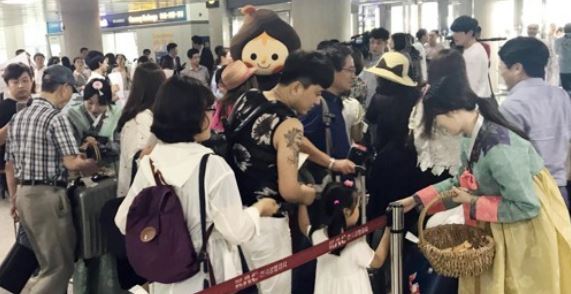The number of Japanese visitors to South Korea may decrease in the wake of North Korea's latest nuclear test, industry sources said Wednesday.
Japanese tourists to Seoul have tended to slip whenever tensions on the Korean Peninsula escalate due to Pyongyang's atomic tests or other geopolitical risks. The isolated North carried out its sixth and most powerful nuclear test on Sunday, drawing strong condemnation from the international community.
According to the Korea Tourism Organization, the number of Japanese visitors to South Korea fell 5.4 percent on-year to some 166,000 in April amid concerns over a crisis on the peninsula.
The April figure snapped a three-month gaining streak. The number fell 10.8 percent on-year in May, 6.9 percent in June and 8.4 percent in July.
Fears arose in April that the peninsula might slip into a crisis as the US aircraft carrier USS Carl Vinson moved to waters off South Korea amid concerns over a North Korean provocation timed with the April 15 birth anniversary of its late founder Kim Il-sung.
The number of Japanese tourists to South Korea declined 7.4 percent from the previous month to around 209,000 in September last year, when Pyongyang conducted another nuclear experiment.
 |
This undated file photo shows Japanese tourists arriving in South Korea. (Yonhap) |
Those figures also fell after previous provocations, including the 2010 torpedoing of a South Korean warship and the shelling of a western border island in the same year.
"Japanese tourists reacted sensitively and many didn't visit South Korea whenever tensions on the peninsula rose due to North Korea's nuclear tests or other provocations," said Lee Kang-wook, a senior researcher at the Korea Culture & Tourism Institute.
Already smarting from a tumble in the number of Chinese visitors to South Korea, the local tourism industry is thus feared to lapse into a prolonged slump.
In the first seven months of this year, 1.28 million Japanese visited South Korea, accounting for the second-largest share of foreign tourists to Seoul after Chinese visitors.
The number of Chinese tourists to South Korea plunged 46.5 percent on-year to 2.53 million during the seven-month period, hit by a diplomatic row between Seoul and Beijing over the deployment of a US missile defense system here.
In March, Beijing imposed a ban on selling package tours to Seoul in an apparent retaliation over the deployment of a Terminal High Altitude Area Defense battery in southeastern South Korea.
The KTO has predicted the number of foreign tourists to South Korea to nose-dive a maximum 27.2 percent in 2017 from last year should China's retaliation and North Korea's nuclear risks last.
Last year, the figure soared 30.3 percent from the previous year to reach a record high of 17.24 million. (Yonhap)








![[Today’s K-pop] Blackpink’s Jennie, Lisa invited to Coachella as solo acts](http://res.heraldm.com/phpwas/restmb_idxmake.php?idx=644&simg=/content/image/2024/11/21/20241121050099_0.jpg)